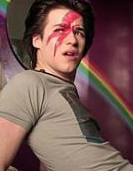C.R.A.Z.Y.
reviewed by
KEN EISNER
Ken
Eisner reviews films for
The Georgia Straight. His last review, of
Born Into Brothels, appeared in 2005, Vol.
4, No. 4.
________________
An
intimate story told on an epic scale, C.R.A.Z.Y. is
a delightfully satisfying mix of the particular and the universal,
with enough dark shading to ward off sentimentality.
Imaginatively
crafted by Quebec veteran Jean-Marc Vallée (Liste
Noir) with a script he adapted from François Boulay’s
novel, with the author’s help, the film starts in 1960
with the birth of Zachary, fourth son of devoted parents Laurianne
and Gervais Beaulieu (Danielle Proulx and an outstanding Michel
Côté). Vallée’s own son, Emile, plays
Zachary in the mid-1960s scenes until his part is taken over
by the handsome Marc-André Grondin, who has the charm
to keep our sympathy right through the razor-blades-and-leather
era. Throughout, the introspective lad remains his dad’s favourite
son, even though the latter’s gruff efforts to ensure
a rough-and-tumble heir increasingly backfire as the boy gets
older.
Throughout, the introspective lad remains his dad’s favourite
son, even though the latter’s gruff efforts to ensure
a rough-and-tumble heir increasingly backfire as the boy gets
older.
While
Zachary comes very reluctantly to grips with his sexuality,
elder brother Raymond (Pierre-Luc Brillant) lives up to macho
ideals, riding a Harley, getting tattoos, doing drugs, and bringing
hot chicks back to his room. But the bearded, brooding fellow
doesn’t seem to be able to get much attention from his
papa, who, truth be told, prefers listening to his Patsy Cline
records to working on cars. In this vein, Dad’s annual
Christmas sing-along with a favourite Charles Aznavour cut is
a running gag that takes on more poignancy as the years go by.
At
127 minutes, the tale could have spent a little more time with
the other brothers, who are handed a few individuating tics
rather than whole personalities. (Their initials add up to the
title, by the way.) And Vallée, in some ways, skirts
around his lead character’s gayness, just as Zachary himself
does for much of the story, going so far as to talk himself
into getting a girlfriend to please the folks (if not the girlfriend).
At the same time, the director’s gentle hand on what could
have been inflammatory material ensures that this remains a
coming-of-age saga that parents can take their own kids to.
The
film is deliriously shot and cleverly edited, even if some of
the period details are a bit off, especially in the mid-1970s.
It also has a phenomenal soundtrack, with Zachary’s bedroom
reading of a classic David Bowie tune one of the best depictions
of adolescent angst and ecstasy ever committed to film. After
all, what teenager hasn’t felt like a “Space Oddity”
without even leaving home?